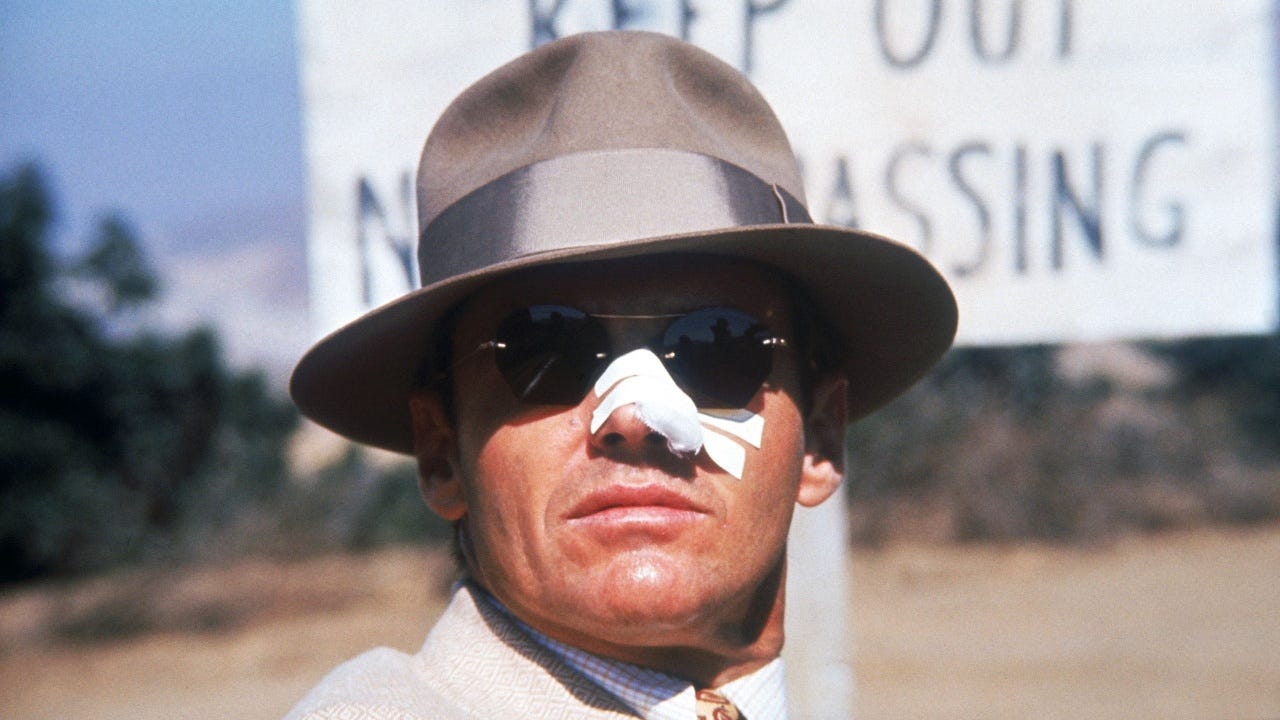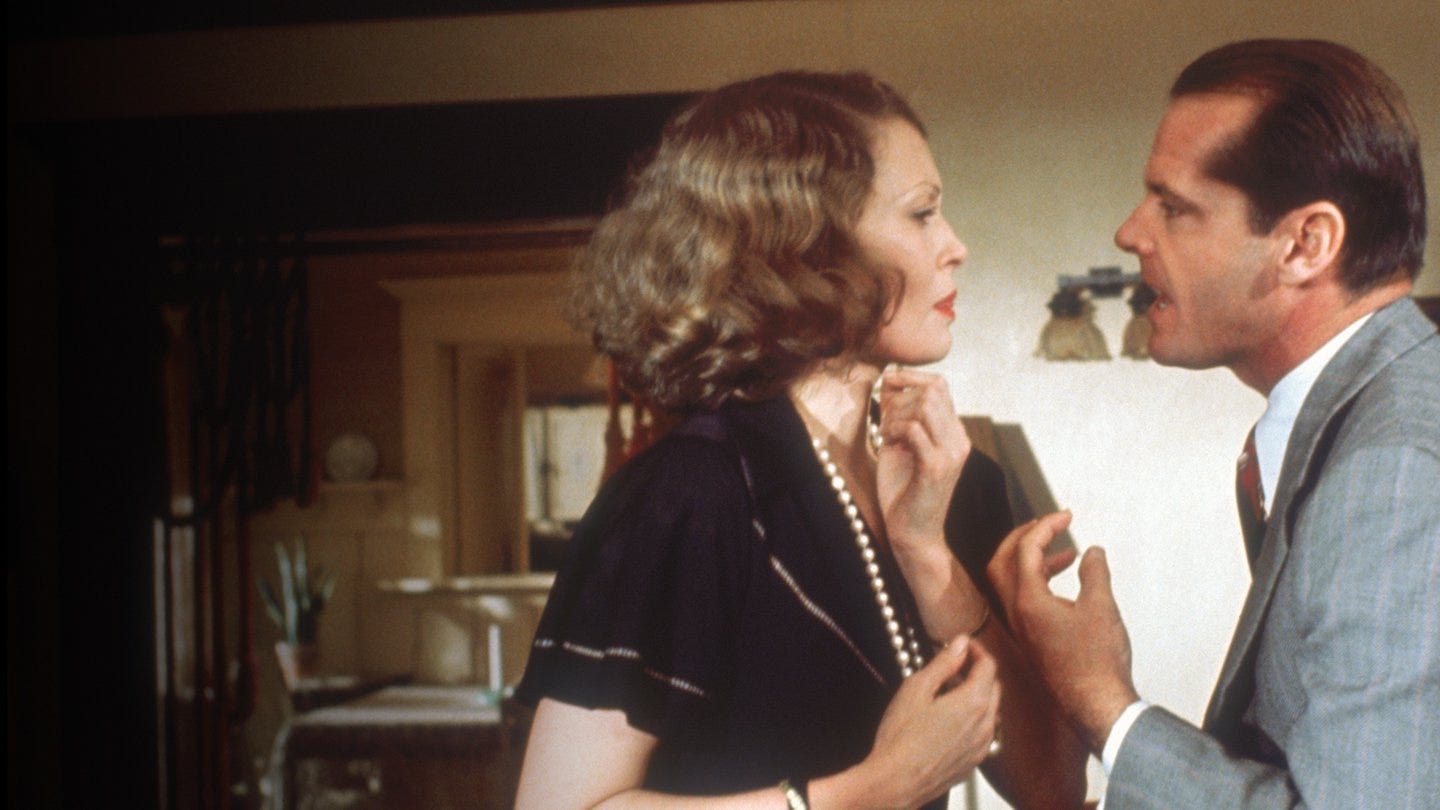(Paramount Pictures)
Only a week following the 50th anniversary of Roman Polanski’s Chinatown (1974) this past June, the film’s screenwriter, Robert Towne, passed away at age 89; and only a week after that, Laurent Bouzereau’s new documentary Faye, on Chinatown lead actress Faye Dunaway was released. Lots of news connected to one of the all-time best classic films. When I was studying cinema in college, and even when I was taking film classes in high school, Chinatown was generally known as the most perfect screenplay ever written. Now, that’s really high praise when the scripts for Michael Curtiz’s Casablanca (1942), Sidney Lumet’s Network (1976) and Spike Jonze’s Adaptation (2002) exist. It’s even more impressive Chinatown is still considered the cream of the crop five decades later since it also has one of the most controversial directors of all time. Like most hits, Chinatown is one of the greatest examples of catching ‘lightning in a bottle.’ Towne and star Jack Nicholson had just collaborated on Hal Ashby’s critically acclaimed The Last Detail (1973) before quickly reuniting on Chinatown. Polanski was directing his second and last Hollywood production after Rosemary’s Baby (1968), also made by Chinatown producer Robert Evans. Dunaway had already been a former Oscar nominee for her breakthrough performance in Arthur Penn’s Bonnie & Clyde (1967). The supporting cast consisted of great character actors like Diane Ladd, Burt Young, James Hong, Rance Howard, Perry Lopez, John Hillerman, Polanski himself and of course, John Huston as one of the most repugnant movie villains out there. Heavy-hitters John A. Alonzo and Jerry Goldsmith handled the cinematography and music score. Everything landed just right.
There are a lot of influential, iconic films I respect, but don’t necessarily consider a personal favorite. Stanley Kubrick’s 2001: A Space Odyssey (1968) and P.T. Anderson’s There will be Blood (2007) are a couple of examples. But with Chinatown, I truly enjoy the viewing experience every time. The handle I chose for my Tumblr account is the name of a character from Chinatown. When I took screenwriting courses, I used the classic as one of my go-to blueprints for how to structure a plot. For a while, I wondered if younger film fans still appreciate Chinatown as much as others from its era, like Francis Ford Coppola’s The Godfather (1972) and Steven Spielberg’s Jaws (1975). Turns out, a lot of them still do. It’s refreshing when I consider one of my college professors way back in 2009 or so, vented multiple times during a class that “you could never make a movie with such slow pacing” contemporarily. Chinatown takes its time to dissect why Detective Jake Gittes (Nicholson) is hired by a woman played by Ladd to investigate her husband’s affair—only to find out the woman was an imposter, and the real lady with the identity is Dunaway’s Evelyn Mulwray Cross, who is wife of the chief engineer of Los Angeles Water & Power; who in return, is the also the former business partner of Evelyn’s powerful father played by Huston. And all the characters are operating around a major drought occurring throughout 1930s LA County.
Historians have naturally noted how similar the backstory of Evelyn’s briefly seen husband is to real life southern California engineer William Mulholland; as well as the 1928 St. Francis Dam tragedy in Santa Clara, CA, which Towne acknowledged in interviews. The writer grew up in LA and wanted to dedicate a story to the history of his hometown, and his admiration for the city truly shows in print and on screen. Ironically, credit for the film’s grim conclusion actually goes to Polanski. Initially Towne wanted Jake and Evelyn to end up together and have the final scene feature a beach sunset. Polanski argued that the film should keep the dark tone it established all the way to the end. No disrespect to the screenwriter, but it’s hard to imagine Chinatown maintaining its iconic status with a traditional happy ending. The final scene we’re left with is one of the most bitter reality checks in movie history.
Chinatown wisely chooses to not include plot devices like flashbacks or narration and lets all the action play out in real time. In fact, most of the time Jake is learning about new clues and information after they’ve happened off screen, without any unnatural exposition. The crime drama is considered the New Hollywood feature to best capture the essence of film noir roughly 15 years after the genre died, and there’s no argument there. If it weren’t for the color cinematography and famously shocking plot twist near the end, Chinatown would fit alongside noir classics like Howard Hawks’ The Big Sleep (1946) and Orson Welles’ Touch of Evil (1958). When people ask why the picture has its reputation for being perfect, it’s simply because everything swiftly falls into place by the conclusion and everyone’s choices are in character and make sense. There is no filler in the dialogue or any overly long monologues. If someone doesn’t enjoy Chinatown, it’s probably because they just don’t care for the story or have issues with someone connected to the film [usually Polanski].
(Paramount Pictures)
Unsurprisingly, Chinatown was a success during awards season the year of release. Nicholson and Dunaway nabbed Best Actor and Actress Oscar nominations [Nicholson also won the award at the BAFTAs and Golden Globes], Polanski was nominated for Best Director at the Academy Awards; on top of a Best Picture nom for Evans. And, of course, Towne won every Best Original Screenplay nomination he received. What else is there to really say that other fans haven’t already shared? Some of the best one-liners come from Towne’s script. “You’re dumber than you think I think you are,” “When you’re right, you’re right, and you’re right,” “Politicians, ugly buildings and whores all get respectable if they last long enough,” “Forget it, Jake…” Polanski was firing on all cylinders, even with the twist now a bit uncomfortably close to the director’s real life history in hindsight. Creative forces were at the top of their game, including Nicholson at his most restrained and Dunaway at her most vulnerable. Naturally neo-noir was suddenly on the market for future filmmaking following Chinatown’s acclaim, most famously Curtis Hanson’s LA Confidential (1997). It’s always amused me how two of the more obvious examples of movies taking inspiration from Chinatown are Robert Zemeckis’ Who Framed Roger Rabbit (1988) and Gore Verbinski’s Rango (2011). As for Nicholson’s directed sequel The Two Jakes (1990), well. It’s probably best most people aren’t even aware it exists rather than it be infamous for its mediocrity.
Whether 50 or 100 or 500 years from its release, I hope Chinatown is up there as one of the great pieces of art to transcend history.







Billy Bob Thornton does an interesting Goliath season that seems to be a remake of this movie you might be interested in checking out.
Really good, Megan.